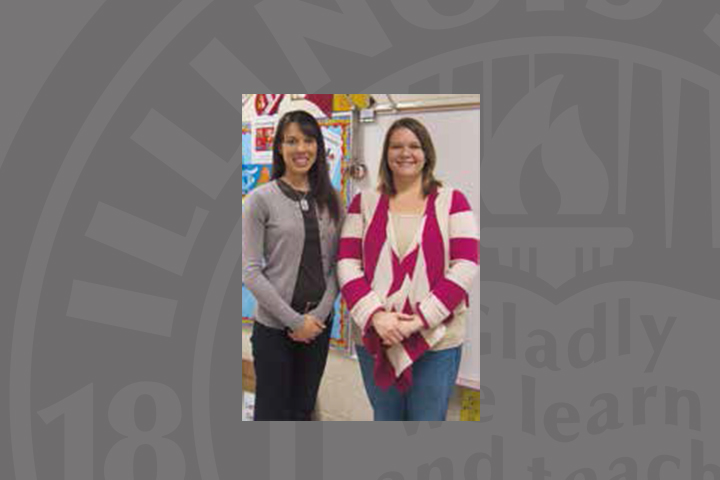Amanda Campisi ’05 and Ashley Outlaw ’06
Each semester, eight of Illinois State’s senior education majors pack up their belongings and head south for student teaching. They drive through the rolling hills of Missouri, past the Oklahoma plains, and into the Lone Star State. This 1,000-mile journey leads them to San Antonio, the setting of their last preservice teaching experience.
For approximately 20 years, the Northside Independent School District (NISD) in San Antonio has partnered with the College of Education to host student-teaching placements for Illinois State University teacher candidates.
Elementary educators Ashley Outlaw ’06 and Amanda Campisi ’05 are two outstanding Illinois State alumnae who made Texas their permanent homes after student teaching there.
Today, the educators work down the hall from each other at Jimmy Elrod Elementary School, but the paths that led them to central Texas were unique.
Outlaw grew up in Bloomington and decided early on to stay in her hometown and attend Illinois State. Before her arrival in Texas, she had never lived away from her family.
“Coming here for four months, 1,000 miles away, it got me at first,” Outlaw said.
Outlaw said her nervousness was short-lived. As the weeks went on, she became less homesick and embraced “Texan” experiences such as going to the rodeo and sitting in a hot tub during the dead of winter.
“Before long, I was thinking, ‘But wait, it’s going to go so fast!’” Outlaw said.
Campisi, a native of Machesney Park, which is north of Rockford, describes herself as more of a rolling stone.
“Whenever I had the chance to study abroad, I did. And whenever I could go somewhere, I went,” Campisi said.
Before student teaching in San Antonio, Campisi took advantage of study-abroad opportunities in Madrid, Spain, and Taxco, Mexico. For her, San Antonio was more of a homecoming.
“I was just glad to be back in America!” she said.
Campisi soon found she shared a unique connection with English learners in her class—a connection that students likely did not see coming from their white teacher from the Midwest. She said these experiences gave her the opportunity to be a student from a different background.
“When I have students in my class who don’t speak the native language, I can honestly tell them that I’ve walked in their shoes,” said Campisi.
School Principal Daisy Whisenant said this situation arises fairly often at Elrod, where most students are Hispanic.
“Minorities are in the majority here,” said Whisenant, who hired both teachers.
Teachers at the school are continuously mindful of their students’ perspectives, enabling cultural knowledge to be shared between and among the students and faculty.
“Each student has experienced different things in their lives and needs a chance to feel represented in our studies and celebrations and have a chance to share their traditions,” Outlaw said.
While Outlaw grew up in a less culturally diverse area, she felt confident in her ability to integrate the needs of all learners into the curriculum. She attributed much of this success to the opportunities she received to put theory to practice in a variety of settings during her teacher preparation.
As a practice, Outlaw and Campisi get to know their students individually and as a group from day one. They use this knowledge to engage all learners.
“It is important to get behind my students’ thinking, understand their point of view, and know their interests,” Campisi said. “When I combine a student’s interest and background knowledge, the lesson becomes significant to the student and is put into their long-term memory.”
The alumnae recognize that their students’ cultural identities are expressed through their families. For this reason, they include countless opportunities for each student to share these important aspects of themselves with their classmates.
The cultural and linguistic differences among students are then used by the educators to enrich the curriculum.
No matter what differences may exist in their classrooms, Campisi and Outlaw understand that the connections they make with students and families will improve learning and add meaning to their journey as educators in Texas.

